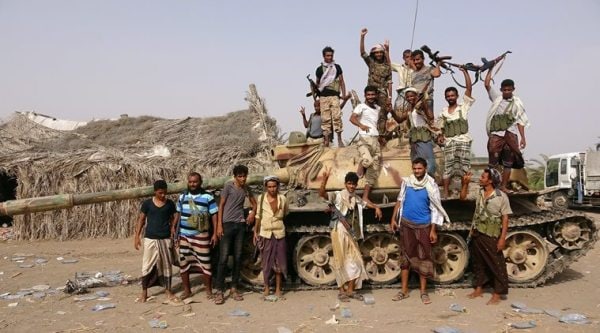Saudi-led alliance set for battle in biggest Yemeni port
It would be the first time since the foreign armies joined the war in 2015 on behalf of Yemen's exiled government that they have attempted to capture such a well-defended major city.

Tribal fighters loyal to the Yemeni government stand by a tank in al-Faza area near Hodeida, Yemen June 1, 2018.
A Saudi-led coalition geared up on Tuesday for a military assault on Yemen’s main port, preparing to launch by far the biggest battle of a three-year war between an alliance of Arab states and the Houthi movement that controls Yemen’s capital. The United Arab Emirates, a member of the Western-backed alliance, set a Tuesday deadline for the Iran-aligned Houthis to withdraw from the port of Hodeidah under UN-led talks.
“These are the last and final hours to get unconditional guarantees that the Houthis will leave the port,” UAE Minister of State for Foreign Affairs Anwar Gargash told Reuters, but declined to discuss military operations.
1m 7s
“If the current situation continues we will have a stalemate politically,” he said. “The last thing we want is to prolong the war in Yemen.”
It would be the first time since the foreign armies joined the war in 2015 on behalf of Yemen’s exiled government that they have attempted to capture such a well-defended major city.
Hodeidah, Yemen’s biggest Red Sea port and the only one under Houthi control, serves as the lifeline for the majority of Yemen’s population, which lives in Houthi territory.
The United Nations said it was engaged in “intense” shuttle diplomacy between the Houthis, Saudi Arabia and the UAE to avert the attack, which it fears could exacerbate the world’s most urgent humanitarian crisis. It estimates that 600,000 people live in the area, and in a worst-case scenario a battle could cost up to 250,000 lives, as well as cutting off millions of people facing starvation and disease from aid and supplies.
A group of US senators urged Secretary of State Mike Pompeo and Secretary of Defense Jim Mattis, in a letter on Tuesday, to strongly support efforts to negotiate a resolution to the conflict and encourage all sides to avoid steps that would further impede Yemenis’ access to food, fuel and medicine.
The UAE’s Gargash said plans were in place to keep the port operational and urged the international community to pressure the Houthis to evacuate and leave the port intact, without planting mines.
Isolating the Houthis
Emirati-led troops have advanced along the southwestern coast to the outskirts of Hodeidah under a strategy to box in the Houthis in the capital Sanaa and cut off their supply lines to force them to the negotiating table.
UAE Minister of State for International Cooperation Reem al-Hashimy said if the port was no longer under Houthi control then the coalition could ease controls aimed at denying arms to the group by doing away with inspections at the Saudi port of Jizan.
“If there is a viable transition to a legitimate presence in Hodeidah this will alleviate the suffering of the Yemeni people and facilitate the flow of goods and aid into Yemen,” Hashimy said in a briefing.
“The current UN inspection mechanism in Djibouti or inspections in the newly liberated ports of Hudeidah would be sufficient to clear all shipments.”
Local military sources said hundreds of Yemeni fighters as well as tanks and gear from the UAE arrived on Monday to reinforce troops, including Emiratis and Sudanese, in al-Durayhmi, a rural area 10 km (6.21 miles) south of Hodeidah.
The sources said UAE-backed Yemeni forces – drawn from southern separatists, local units from the Red Sea coastal plain and a battalion led by a nephew of late former president Ali Abdullah Saleh – were “at the doors” of Hodeidah airport.
The Houthi official responsible for foreign affairs, Hisham Sharaf, said the advance was a military escalation aimed at hampering U.N. efforts, Houthi-run media said.
The Sunni Muslim Gulf states intervened in Yemen to restore the exiled government and thwart what Riyadh and Abu Dhabi see as expansionist objectives of their Shi’ite foe Iran.
The Houthis deny they are Iranian pawns and say their revolt is against corruption and defending Yemen from invaders.
“I think the Emiratis have done a good job in presenting compelling arguments about why an operation (on Hodeidah) could in the end tip the balance and apply enough pressure to bring the Houthis to the table,” a Western diplomat said on Monday.
Saudi Arabia’s Western allies, which sell arms to coalition states, have not said publicly if they approve of the assault.
Riyadh says the Houthis use the port to smuggle Iranian-made weapons, including missiles that have targeted Saudi cities – accusations denied by the group and Tehran.
Houthi leader Abdul Malik al-Houthi has warned the group will attack oil tankers in the event of an assault on Hodeidah.
The coalition says it aims to protect Red Sea shipping.
For all the latest World News, download Indian Express App







































No hay comentarios:
Publicar un comentario